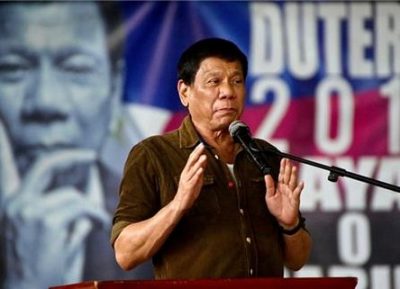By
Amnesty International
The Philippines’ new President Rodrigo Duterte must fulfil his inauguration pledge to uphold the country’s commitment to international law and lead a break with the country’s poor human rights record, human rights NGO Amnesty International have stated.
“President Duterte has been elected on a mandate to uphold the rule of law. It is encouraging that he spoke of honouring the Philippines’ obligations under international law in his inauguration speech. But now he is in power, he needs to lend substance to those words and break with his earlier rhetoric,” said Rafendi Djamin, Amnesty International’s Director for South East Asia and the Pacific.
Throughout his election campaign, President Duterte made inflammatory remarks that, if translated into policy, would mark a sharp deterioration in the already problematic human rights situation in the Philippines.
Since winning the presidential election, President Duterte triggered widespread alarm by calling for the restoration of the death penalty, vowing to preside over a wave of extrajudicial executions, threatening journalists, and intimidating human rights defenders.
This is in a context where a climate of impunity for human rights violations prevails in the Philippines, including for torture and other ill-treatment by the police. Only one police officer has ever been brought to justice under laws criminalising torture, and few have been held accountable for killings of journalists.
“President Duterte’s promises to adhere to the rule of law and to Philippines’ international obligations mark a welcome change from earlier rhetoric, but it is important that they are not merely issued to placate critics but are translated into actual policy and implemented in practice,” said Rafendi Djamin.
The death penalty
Among President Duterte’s many troubling positions is his intention to restore the death penalty. Doing so would reverse a decade-long ban in the Philippines on this cruel and irreversible punishment. For this position, the Philippines is a regional leader as it went against the grain of other countries in the region.
President Duterte has said that he intends to apply the death penalty to a range of crimes including offences that do not meet the threshold of “most serious crimes,” which is the only category of crimes for which international law allows the death penalty.
“There is no evidence that the death penalty serves as any more of a deterrent than prison. At a time when this cruel, inhuman and degrading punishment has been abolished in the majority of the world’s countries, reimposing it will set the Philippines in the wrong direction,” said Rafendi Djamin.
Amnesty International opposes the death penalty in all cases, regardless of the crime. The organization has additional concerns about deep and structural flaws in the Philippines’ criminal justice system, which serve to compound the injustice of the death penalty.
A 2014 Amnesty International report, Above the Law: Police Torture in the Philippines documented the widespread use of torture and other ill-treatment to coerce ‘confessions’.
Extrajudicial executions
In recent weeks, President Duterte promised large sums of money as rewards to urge people to kill suspected drug smugglers, said that security forces will be allowed to carry out “shoot-to-kill” orders against criminal suspects resisting arrest, and has displayed a callous disregard for killings of journalists.
Summary killings of criminal suspects are extrajudicial executions, which violate both international and Philippines law. The authorities should make clear to the security forces that they will not be tolerated under any circumstances. Security forces may use force only when strictly necessary and to the extent required for carrying their law enforcement duties; they may not use lethal force except when strictly unavoidable in order to protect life. The governments should ensure that those responsible for extrajudicial executions are brought to justice.
“Extrajudicial executions will deliver neither the justice that victims deserve nor the security that people in the Philippines seek. What the Philippines needs is an overhaul of its judicial system to end delays, enhance investigations, ensure that criminal suspects are prosecuted in fair trials, and protect victims and witnesses from threats and reprisals,” said Rafendi Djamin.
Safety of journalists
Duterte’s disregard for the safety of journalists is striking in a country where seven journalists were killed last year, and more than 150 media workers have been killed with impunity over the past 30 years.
“President Duterte makes full use of his right to freedom of expression. He should respect the fact that others also have this right to write and speak freely, and the authorities must respect and protect their right to do so without fear of imprisonment, threats, or violence,” said Rafendi Djamin.



No Comments Yet!
You can be first to comment this post!